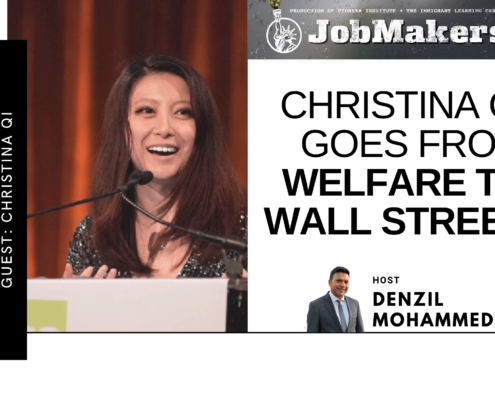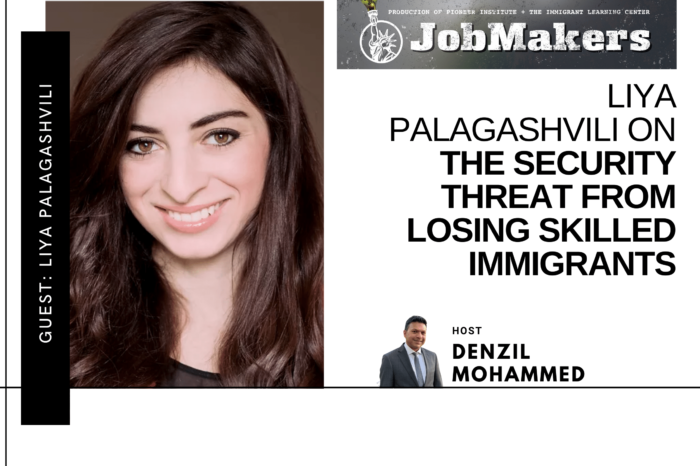Liya Palagashvili on the Security Threat from Losing Skilled Immigrants
/in Economic Opportunity, Featured, JobMakers /by Editorial StaffThis week on JobMakers, host Denzil Mohammed talks with Dr. Liya Palagashvili, immigrant from the former Soviet Union, Senior Research Fellow at the Mercatus Center at George Mason University, and affiliated research fellow at NYU Law. Dr. Palagashvili shares findings from research she co-authored on the Optional Practical Training (OPT) program, which fills the gap for international students between studying in the U.S. and being employed here through a work visa. The program enables America to retain talented students at just the time in their lives when they’re likely to generate ideas and start businesses, but recent legislation seeks to end the program. Dr. Palagashvili explains why such a move is counterproductive and even a national security threat. Instead, she argues, reforming and making it easier to access OPT would help enhance America’s edge in the global search for talent, and prevent that talent from moving to Canada, the U.K. and other countries – as you’ll learn in this week’s JobMakers.
Guest:
 Liya Palagashvili is a Senior Research Fellow at the Mercatus Center at George Mason University. Her primary research interests include entrepreneurship, regulation, and the gig economy. She has published academic articles, book chapters, policy papers, and articles in media outlets such as the New York Times and Wall Street Journal. In 2016, she was named one of the Forbes’ “30 under 30” in Law & Policy. Palagashvili was an Assistant Professor of Economics at State University of New York-Purchase and earned her Ph.D. in economics from George Mason University.
Liya Palagashvili is a Senior Research Fellow at the Mercatus Center at George Mason University. Her primary research interests include entrepreneurship, regulation, and the gig economy. She has published academic articles, book chapters, policy papers, and articles in media outlets such as the New York Times and Wall Street Journal. In 2016, she was named one of the Forbes’ “30 under 30” in Law & Policy. Palagashvili was an Assistant Professor of Economics at State University of New York-Purchase and earned her Ph.D. in economics from George Mason University.
Get new episodes of JobMakers in your inbox!
Read a Transcript of This Episode
Please excuse typos.
Denzil Mohammed:
I’m Denzil Mohammed. Welcome to Jobmakers.
Denzil Mohammed:
You may have heard about the H1 B skilled worker visa that permits foreign-born talent to work at US companies. But have you heard about the O P T or optional practical training program that comes in between studying in the us as international student and working on a work visa. It’s existed since the post world war years allows us to retain this, how to we educated. And it’s often the time when immigrants come up with ideas and start businesses, it helps the us yet. Recent proposed legislation seeks to end the program completely under the guise of sticking it to big tech for Dr. Leah Palagashvili, immigrant from the former Soviet Union, senior research fellow at the Mercatus center at George Mason university and affiliated research fellow at NYU law, wiping out this program is not only counterproductive. It’s also a national security threat. In a policy brief coauthored with Jack Salomon, also at the Mercatus Center, she argues that reforming and making it easier to access optional practical training would build this country’s edge in the global search for talent. The brief titled “Reforming optional practical training to enhance technological progress and innovation,” demonstrates how we all benefit from having foreign-born talent working and innovating alongside US born talent. Yet lately that talent has been moving to Canada, the UK, other countries, and this undermines our ability to keep up and be safe. As you’ll learn in this week’s Jobmakers.
Denzil Mohammed:
Liya Palagashvili, senior research fellow at the Mercatus Center at George Mason University and affiliated research fellow at NYU law, welcome to the Jobmakers podcast. How are you?
Liya Palagashvili:
Thank you so much for having me on.
Denzil Mohammed:
So you are here because you wrote a policy brief on what’s called the O P T or optional practical training program that is afforded to foreign-born university students in the US. So maybe just more broadly, tell us about the impact of international students on US college campuses and the wider economy.
Liya Palagashvili:
So international students make up a large share programs at universities and especially in graduate programs. If we just look at some examples in the USyou know, university of Southern California and New York university, international students make up at least a third of the student body. At Columbia, international students make up over half of the entire student body. And actually what should really be celebrated is that they play a huge role as contributors to stem programs in particular. So stem programs are those that are science, technology engineering and mathematics degrees. And about half of all international students in the United States are in, are enrolled in stem programs. Uand also if we look at some specific programs,some specific stem programs across us colleges, we see that international students are making up even a larger share of those programs. Uso for example, if we look at petroleum engineering, international students account for 82% of graduate students at petroleum engineering,74% and something like an electrical engineering, 71% in computer information sciences.
Liya Palagashvili:
So they really are driving stem programs at universities. And I think it’s pretty important to point out because there’s sometimes a concern about whether international students are quote unquote crowding out American studentswhether their presence in these programs means some American student is unable to attend that particular college. And that’s just simply not the case. So in many research studieswe actually find that international students have a positive effect on enrollment on American studentsbecause international students are paying such a high tuition that it actually helps subsidize the cost of enrolling additional domestic students. I don’t know if you’ve ever looked at tuition rate differences between international and domestic students, but you’ll see that international students are often paying like four or five times the tuition rate of American students.
Denzil Mohammed:
I am very well aware of that because I was one of those international students <laugh> and yes, we paid a lot. And we talked about universities in California and New Yorkbut it’s all across country. I mean, university of Alabama, UT Austin immigrants are making up a large portion of stem programs everywhere, and they’re helping to maintain these stem programs as we’ll talk about a little bit more. So the American tech workforce act of 2020 calls for the end of optional practical trainingas it quote “mostly benefits, big tech companies by providing tax breaks and allowing them to hire workers at a lower cost.” So they saythe bill is introduced by Republican rep Jim banks, as part of a Republican study committee initiative to quote “hold big tech accountable.” This is something we hear about all the time. So you and your colleague, Jack Salamonargue in your policy brief that quote “bolstering the O P T or optional practical training program rather than underminingthe United States edge in the global for talentis what needs to be done” and you recommend a series of reforms. So let’s back up a little bit. What is the optional practical training program and why has it been singled out?
Liya Palagashvili:
So theO P T program, the optional practical training program. So it’s designed to allow foreign students to work for at least one year upon graduation from a US college or university. And recently they’ve allowed a maximum to three years if you graduate from a stem field. So again, the stem extension is relatively, is relatively new, basically the O P T program acts as like a primary on-ramp for highly educated foreign students who graduate from US universities and college to enter the USlabor force. And over the years, it has grown significantly. And that’s part of the reason it has been singled out as well. Cause they’re like, look at all these international students coming in on, on the O P T programwho are taking quote unquote American jobs. So over the past 20 years, the number of forum students participating in O B T has grown almost tenfold. There were under 25,000 participants in, from 1999 to 2000. So in that academic year, and then in the last, in, you know, last few years, we’ve had upwards of over 200,000 O P T participants. And some of these OPT participants will seek H1B employment sponsorshipthrough their respective employers after.
Denzil Mohammed:
And this, the rationale behind this is not an act of good will to international students. Obviously there’s some benefit or great benefit to the us by retaining this talent, right?
Liya Palagashvili:
Yeah, absolutely. So they’re retaining the talent. And, and that’s another thing that we can, we can have a little bit of more of a deep dive on, but international students and particularly they’ve played a significant role in our economy as inventors and also patenting in new ideas especially in science and technology in, in technology fields, which is great for us economy because that helps boost innovation and productivity. If we look at something like patent rates, right? So we know that we, we have studies that show that immigrant graduates with science and engineering degrees have historically had a patent rate, double the average American rate. And there are several studies that try to parse this out further. So there’s one influential study that found that since 1940, a 1% increase in immigrant college graduates, as a share of the population increases the number of patents per capita by about nine to 18%. This is broadly the case for all immigrants, not only, you know, student in international students in particular, cuz if we look at immigrants, share of us patents that has also risen significantly over the year. So again, not only international students, but immigrants as well. In one, in one study, we know that in 1975 immigrants share of patents was only 9%, but by 2015 immigrant patents represented 28% of all patents in the us.
Denzil Mohammed:
There’s a wealth of data and examples all over the us history and across I media’s today, that points exactly what you’re talking about and shows us who this talent is and what they do that benefits, not just them, but the country as a whole. So you just said overall immigrants international students are more likely to raise the rate of patents. They, you also stay in your policy that they’re more likely to start a successful company when compared to us boy students, I like to say that the act of migrating is itself an entrepreneurial act. So it it’s sort of comes naturally to many of these students. What are some of the other data points you find in your research that sort of speaks to this?
Liya Palagashvili:
Yeah, so that that’s exactly right. It, it is important to point out that these international students contribute not only through, you know, employment and, and patents, but they later end up as entrepreneurs and innovators in the technology industry. Actually, if we look at all of the billion dollar startups in the United States 22% of them, so think about companies like zoom, Tesla, SpaceX Instagram, right? They had at least one immigrant founder who came to the country as an international student. And then once that even found that international students are more likely to start a successful company when compared to domestic students. And by the way, we just want to emphasize this again, that we’re, it’s not only international students, but we’re seeing this among immigrants in general, this is the case for immigrants in general, too. So we know that immigrants show an 80% higher rate of entrepreneurship than native born individuals. And they start companies quite quickly after entering the United States.
Denzil Mohammed:
Wow. That’s incredible. Immigrants are job makers, not job takers. And is there something, is there something about the us that is that brings out this entrepreneurship in people?
Liya Palagashvili:
Well we have good institutions that are pretty supportive and conducive for entrepreneurship in general. It’s relatively easy to start a business here. We actually also have a culture that is open to experimentation and failure. That’s not always the case in other countries, sometimes in other countries, if you start a business and you fail it’s, it’s frowned upon, right? So society does not like that. Your social status goes down. If you start a, if you start a business and failed and I think that’s important to highlight that in the us, as, as people, you know, as individuals, society, we don’t frown upon failures. And, and, you know, we are open, we are a culture that is open to experimentation and just to see where it goes, right?
Denzil Mohammed:
So in a, in a future episode we’re gonna hear from a, a, a entrepreneur from France who specifically says that that culture of entrepreneurship does not exist. They don’t even want you to start businesses. They just want you to enter the government and have a conventional life. And that failure is indeed frowned upon. So there is something special about the us and some that’s something special has always existed in the us to allow for entrepreneurship from us foreign people and from immigrants. But you also state that this O PT optional practical training is a national security necessity. So to the untrained eye, this site seemed a little bit absurd ex explain what happened about to lose.
Liya Palagashvili:
So that was a statement from the department of Homeland security. Actually it was in a 2008 report. They concluded that the expansion of O P T is a national security necessity. And I’ll quote directly from the department of Homeland security on this. So they said quotes with their large and growing populations of stem, graduate scientists, high tech industries in Russia, China, and India, and others in the O C D now compete much more effectively against the us high technology industry end quote. So then the DHS goes on technology that the O B T stem extension should be justified on the grounds that American companies are harmed when they cannot recruit high skilled foreign workers. So again, I think that’s really important to point out as well that the DHS sees this as a national, as a national security reason. And by the way, America has been an active recruiter in global talent.
Liya Palagashvili:
You know, we have recognized that when the best and the brightest minds blend their, I blend their ideas and talents, innovation follows. And I think this type of national security reasoning is coming back in our minds. As we’re thinking about competition with China, we’re trying to be a little bit more thoughtful about, you know, our competition with China, and maybe we’re starting to remember our old methods that works in the past, which is okay, bring, bring the best. And the brightest mind America and innovation and innovation will flow. And it’s also a very low cost and effective way to increase America’s edge over China, you know, let America access the world’s most talented people.
Denzil Mohammed:
That’s a very, very important point. So a we don’t want to teach and educate people and then just send them elsewhere. We want to keep that talent here. You spoke earlier about companies that had at least one immigrant founders, so that talent foreign born talent mixes with the us born talent to found incredible companies of innovations. So not only do we benefit from them, but we collaborate with foreign born talent in the us and that helps us keep our competitive edge and in a world that is not only much more competitive and globalized, but, you know, cybersecurity threats as one issue we do need to have a competitive advantage.
Liya Palagashvili:
There is a university of Pennsylvania study that examined I think over 2000 us companies from 1994 to 2014. And they found when these us multinational companies face H one B V Z restrictions, which prevented them from hiring the high, skilled foreign workers that they needed in the us, these companies instead increased employment in their overseas locations. And ironically, the top three locations were Canada, India, and China <laugh>. And by the way, we, we see this anecdotally too. So, you know, Microsoft has continued to open up research and development offices, affiliate offices in, in Canada, they did this in 2007, they did it again in 2018. And if you look at their announcements, just read them. And they actually say, we’re doing this to attract top talent because in Canada their immigration system is much more favorable and open to high, skilled high skilled workers.
Denzil Mohammed:
So, you know, America, first nationalism is not gonna get you far when it comes to attracting and keeping the talent that is gonna make us competitive and, and, and have an edge over other country. We have to go wherever the talent is. So what have been the trends recently, you talked about, you talked about Canada, you talked about Eastern Europe Russia, China, India what has been the trends recently, both here in the us and among our competitors when it comes to attracting high, skilled foreign talent in general.
Liya Palagashvili:
So we have seen declining rates of international students to the us. And this has been since 2015. And when we look at survey questions about why this is the case, they point to the difficulty in being able to enter the us labor force. Postgraduation. on the other hand, if we look at what’s happening in Canada and, and in the UK both of those countries have actually revamped their immigration policies to attract more international students and to base and to streamline and to make it easier to have those international students get jobs. And in Canada and in the UK post-graduation, and in fact, we’re seeing more international students in the UK and in Canada.
Denzil Mohammed:
Interesting. So it’s declining in the us, and it’s increasing among our competitors, even our closest neighbor to the north. That seems like a bit of a tragedy. So what do you recommend we do about the optional practical training program, whereasthis bill wants to cut it entirely. You say that we need to actually foster it and increase it.
Liya Palagashvili:
Yeah. So my my co-author Jack Salamon and I have set of proposals that we think will help reform the O P T program. I think first and foremost, and this will be one of the easiest things we can do is just extend those eligible years from one year to three years, which is already what’s happening in the stem program. Right? So if you graduated with a stem degree, you have three years to work on the O P T. We can make that the case for all graduates, not only stem, so increase eligible years of work for non stem graduates on O P T from one year to three years. The second thing is I, as I mentioned before, in the beginning, we didn’t have this restricted restriction on the O P T program that said graduate students who international students have to work in industries that are related to their field.
Liya Palagashvili:
So we can change that to go back to the original part of the program, which is allow these foreign graduates to work in industries, unrelated to their field of to their unrelated, to their field of study. Another, another reform idea we have is eliminating the minimum working hour requirements for employment authorization and then also removing outdated employer sponsorship requirements. So some of these other ones are just basically streamlining the process because it takes, it takes a long time and a lot of paperwork in the us to authorize employment for the O B T. And then in the policy brief, you’ll actually see, we have a little table where you can see the differences, how long it takes in the same type of requirements in Canada and the UK, and they’re much faster and much easier than it is in, in the us. So again, to compete with our competitors, Canada and the UK, we can, we can just basically streamline some of these things, make it easier.
Denzil Mohammed:
And many of these things don’t require Congress to act or the President it’s statutory under the department of security, right?
Liya Palagashvili:
Yes, yes, that’s correct.
Denzil Mohammed:
So there are things that we can be doing right now that would be easier to implement and beneficial to us, but we’re not doing it. We’re not, we’re not doing it. And clearly this is gonna be a tough sell to some Americans, even though what you outline here has been very, very compelling both in this interview with you and, and in your policy, what should skeptical Americans keep in mind by considering your proposal in this time of heightened restrictionist and nationalistic sentiments?
Liya Palagashvili:
I think one framework that we as Americans could utilize that I mentioned earlier is just, you know, if we think about America first, right, I’m gonna use that motto America first. Well for America first, it helps America to have the best and the brightest talent come to America and work in America and come up with inventions in America and boost productivity in America and Bruce, and basically make America a global leader and technology. And so I think, again, if you’re thinking about America first, and you don’t want to, you know, you’re not thinking about, you know, we’re helping these immigrants, then this is, this is one of the best ways you can help America, right. Is allow high, skilled talent high, skilled talent to come in.
Denzil Mohammed:
That’s, what’s gonna keep America first or ahead. And as, as you mentioned, since 2015 that entry of foreign of high, of best, and the brightness has been declining. So we are really in danger of losing that edge. And it is something that we really do need to keep in mind, especially as we see tensions with pieces like Russia and China escalating you have your own immigration story, don’t you?
Liya Palagashvili:
I do
Denzil Mohammed:
Tell us a little bit about it.
Liya Palagashvili:
So this is not a high skilled immigration story. This is a pure luck immigration story. So I was born in the Soviet union as it was collapsing. And we weremy family and I were refugees from Azerbajian to Armenia, unfortunately, after the Soviet union was collapsing, there were wars that broke out and all the different in all the different countries that were part of the Soviet union. And so I’m part Georgian, part Armenian. We had, we moved, we, you know, moved to Armenia and were living there for basically five years of, of war between us Aja and Armenia. There were a lot of blockades food shortages. It was a very dark period as my parents describe it. I don’t remember too much cuz they tried to keep it very light inside of the house, even though, and I was young, but it was, it was a pretty bad time.
Liya Palagashvili:
But one day we received invitation. We received a letter in the mail and basically said we had won the green card lottery to come to United States. Andthat was in 1995. So we moved to the United States in 1995. I was seven years old at the, at the time and it’s just completely changed our lives and the trajectory of our lives. And I know by comparison, cuz I have cousins and family who are still there and they’re nowhere, you know, nowhere near where we are, they don’t have the same opportunities and they’re almost still stuck in the same, same place where they were 30 years ago.
Denzil Mohammed:
So Liya Palagashvili, senior research fellow at the Mercatus Center at George Mason university. Thank you so much for joining us on the Jobmakers podcast and for your research.
Liya Palagashvili:
Thank you so much for having me on it was great to chat with you about this
Denzil Mohammed:
Jobmakers is a weekly podcast about immigrant entrepreneurship and contribution produced by Pioneer Institute, a think tank in Boston and the Immigrant Learning Center in Malden, Massachusetts, a not-for-profit that gives immigrants a voice. Thanks for joining us for this week’s special policy episode on retaining immigrant talent to benefit this country. If you know an outstanding immigrant business owner or innovator or researcher, email me at denzil@jobmakerspodcast. I’m see you next Thursday at noon for another episode.
Recent Episodes:

Mahmud Jafri Builds on a Pakistani Legacy in America
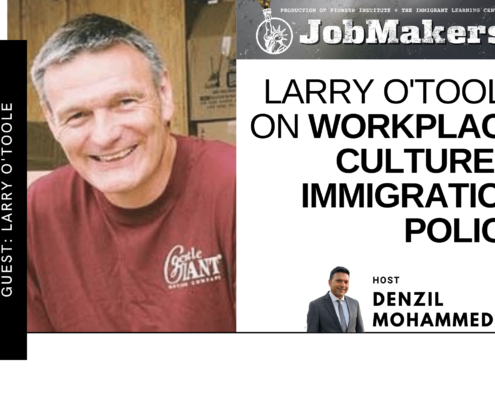
Larry O’Toole on Workplace Culture & Immigration Policy

Amar Sawhney on Sikhs, STEM & COVID
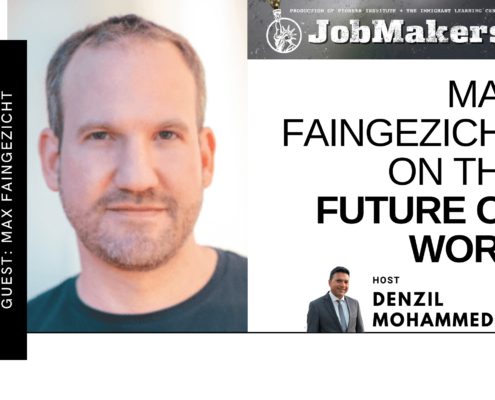
Max Faingezicht on the Skills Gap & the Future of Work
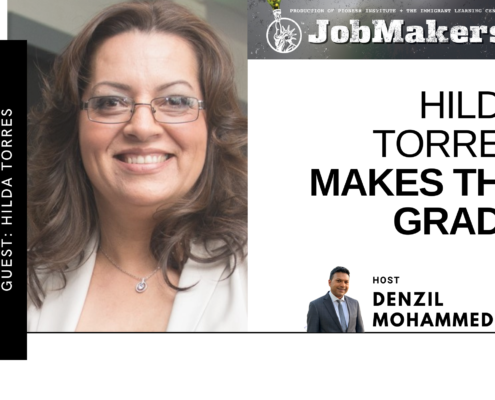
Hilda Torres Makes the Grade
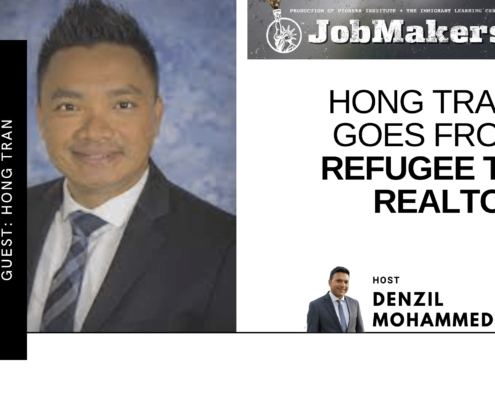
Hong Tran Goes from Refugee to Realtor
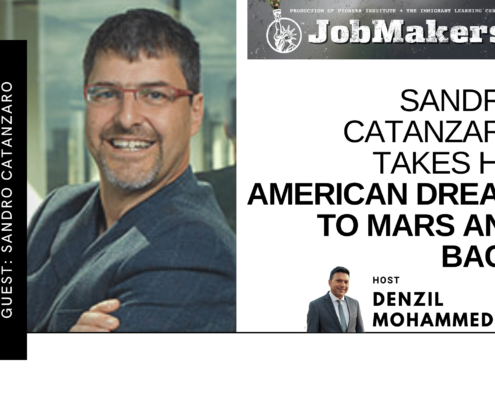
Sandro Catanzaro Takes His American Dream to Mars and Back
